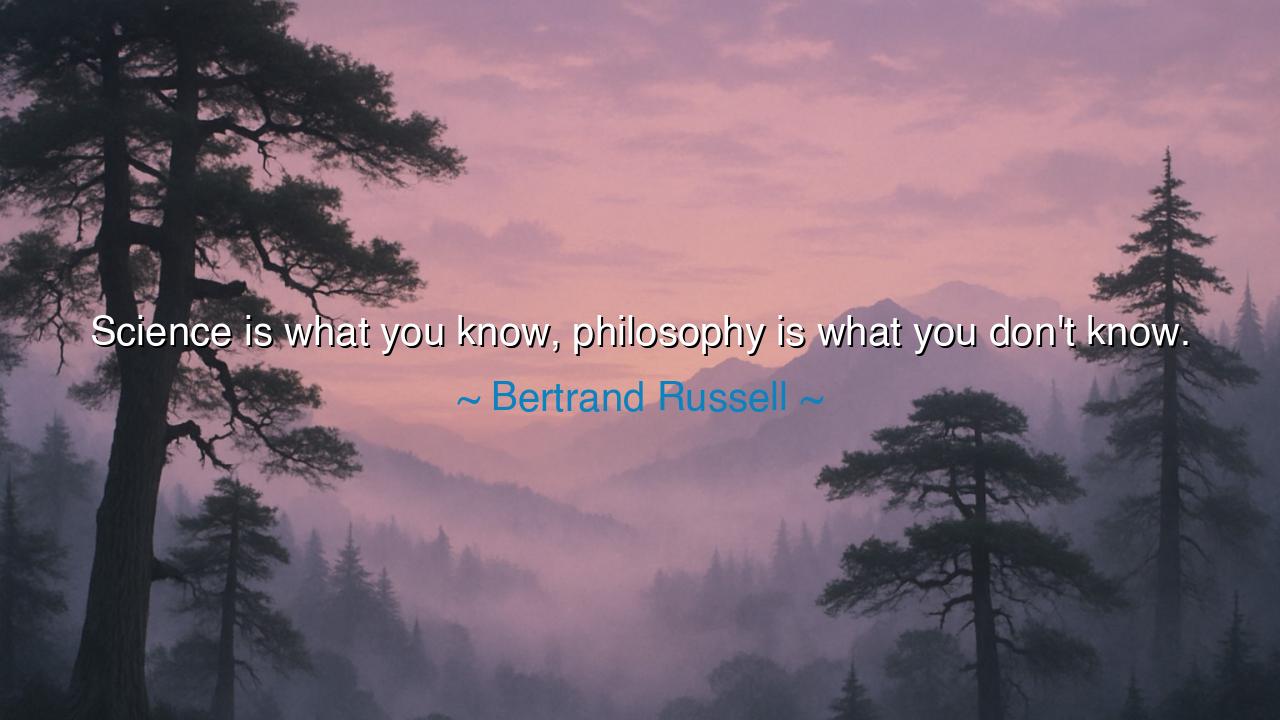
Science is what you know, philosophy is what you don't know.






"Science is what you know, philosophy is what you don't know." These words, spoken by the great Bertrand Russell, offer a profound reflection on the relationship between knowledge and inquiry. Science represents the accumulation of facts, the concrete understanding of the world around us—its laws, its workings, its truths. Philosophy, on the other hand, dwells in the unknown, the realm of questions that have yet to be answered, the quest for meaning that stretches beyond empirical data. Russell’s insight draws a stark line between the certainty that science provides and the uncertainty that philosophy embraces. It is the scientist’s realm to know, and the philosopher’s task to ask: What lies beyond the borders of what we already understand?
In the days of the ancients, Socrates, the wise Greek philosopher, famously declared, "I know that I am intelligent because I know that I know nothing." In his humility, Socrates acknowledged that the true pursuit of knowledge lies not in the certainty of answers but in the awareness of the vastness of what remains unknown. Philosophy begins where science ends, with the recognition that the universe is far larger and more mysterious than our current understanding can encompass. In the dialogues of Plato, we see Socrates perpetually questioning the very foundations of knowledge—seeking not conclusions, but questions that point to deeper truths about the human condition, existence, and the nature of the cosmos. To philosophize is to dwell in the realm of the unknown, not as a weakness, but as a strength, for it is through inquiry that humanity continues to grow.
This dynamic interplay between what is known and what is unknown has fueled the great advances in both science and philosophy. Consider the work of Isaac Newton, whose laws of motion and gravity laid the groundwork for much of modern science. Newton knew and understood the mechanics of the physical world, and in doing so, he established a foundation upon which countless other minds would build. Yet, even as Newton’s contributions advanced the certainty of science, he too remained mystified by the more profound questions that lay beyond the realm of the physical. In his own writings, Newton acknowledged the vastness of the unknown, especially when it came to the deeper philosophical questions surrounding the nature of space, time, and the divine. Thus, Newton’s greatness was not merely in what he knew, but in his humility before the things he did not.
Philosophers and scientists alike are driven by the impulse to uncover the mysteries of the universe. Albert Einstein, another towering figure of modern science, recognized this intersection between science and philosophy. His theory of relativity transformed our understanding of space and time, yet it also raised new questions about the nature of the universe—questions that were not answerable by science alone. The famous thought experiment of Einstein, in which he imagined riding alongside a beam of light, led him to insights that changed the course of physics. However, his philosophical musings on the nature of reality also pointed to the deep interconnection between the scientific method and philosophical speculation. Science provides answers, but it is philosophy that opens the door to new realms of inquiry, driving us toward the unknown.
This distinction between science and philosophy also speaks to the very essence of the human experience. It is in the scientific pursuit that we seek to make the invisible visible, to define, measure, and categorize the world. It is in philosophy that we seek to understand the meaning of existence, to grapple with the mysteries of the soul, the mind, and the universe. The two realms are not in competition, but in partnership. While science seeks to explain, philosophy dares to ask why. Consider Kant’s exploration of the limits of human understanding, where he examined the relationship between human perception and the ultimate truths of the cosmos. For Kant, the role of philosophy was to understand not just what we know, but how our minds are limited in their ability to know the deeper truths of the universe.
The lesson from Russell’s words, therefore, is one of balance and humility. Science gives us the tools to understand the world, but it is philosophy that reminds us of the vastness of what we have yet to comprehend. The world is full of mysteries, and while science will continue to illuminate the shadows, philosophy will always lead us to the edge of the unknown. In our own lives, we must embrace both realms. We must seek knowledge with the precision and clarity of the scientist, yet remain open to the endless questions that stir the soul, just as the philosopher does. Together, these two forces drive us forward, toward greater understanding and deeper wisdom.
Let us take up this dual mantle in our own pursuits. As we seek the truth in the fields of science, art, or life, let us remember that the pursuit of knowledge is not merely about accumulating answers, but about recognizing the endless questions that surround us. Just as Einstein blended the realms of science and philosophy, so too should we aim to expand our minds not only with the truths we can prove but with the questions that challenge us to grow. In this balance, we find the path to true enlightenment, where science and philosophy walk hand in hand toward a future of deeper discovery.






AAdministratorAdministrator
Welcome, honored guests. Please leave a comment, we will respond soon